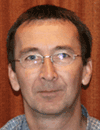Other Track AgendasAdvances in qPCR | Epigenetics | Genomic Biomarkers | Next-Gen Sequencing | RNAi & miRNA |

Thursday, 19 April 201208:00 | Registration | |
Session: Data Analysis and Bioinformatics |
| | 09:30 |  | Keynote Presentation Long-Range Phasing of SNPs and Structural Variants in the Human Genome.
Ewen Kirkness, Professor, The J Craig Venter Institute, United States of America
A combination of mate-pair and single-cell sequencing has been used to construct long-range haplotypes of sequence variants across the human genome. |
| 10:30 | Coffee Break and Networking in Exhibition Hall | 11:15 | Computational Analysis of Human Immune Repertoire
Wenzhong Xiao, Assistant Professor, Massachusetts General Hospital, United States of America
The immune repertoire of an individual is the collection of antigen receptors of B or T cells generated by rearrangements of V(D)J gene segments and somatic hypermutations in response to pathogens as well as autoantigens. High-throughput sequencing (HTS) enables the comprehensive examination of the repertoire which provides important information on the body’s immune state and competency in health and disease. However, new technology inevitably comes with challenges. Sequencing errors introduced during sample processing and sequencing steps can lead to misidentification of clonotypes and artificial inflation of the diversity. Moreover, sophisticated statistical and computational approaches need to be developed to evaluate the state of the immune repertoire from the large amounts of HTS data for the diagnosis and prognosis of immunological and other related diseases. I will discuss the testing experiments and computational algorithms to improve the accuracy of identifying low frequency clonotypes (i.e. somatic hypermutations), as well as the statistical approaches we developed to model the molecular evolution of the immune repertoire for disease detection and monitoring. | |
Session: Applications of Sequencing Data |
| | 11:45 | ChIP and Methyl Sequencing, Dissecting the Subtleties of the Genome
Masoud Toloue, VP of Genomic Research, Bioo Scientific Corporation, United States of America
Strategies for massive parallel sequencing have revolutionized research across diverse scientific disciplines. Despite these advances DNA sample preparations continue to use outdated, biased and cumbersome methods. We will describe our latest genome wide comparative Methyl-Seq and ChIP-Seq data along with how sequencing results benefit from these new techniques. | 12:15 |  Technology Spotlight: Technology Spotlight:
High Efficiency, Chimera-Free Library Preparation for NGS Platforms: NxSeq™ Technology
Jason Mayr, Key Account Manager, Lucigen
The accuracy and efficiency of next-generation sequencing (NGS) depends on the quality of the libraries used. Biased libraries with artificially joined segments (chimeras) can complicate genome assembly and may cause incorrect conclusions. Existing NGS sample-preparation kits are not always optimized for efficient tailing and adapter ligation, resulting in low quality libraries with multiple forms of bias. The NxSeq™ DNA Sample Prep Technology has been optimized to provide higher complexity libraries with fewer artificial joints and more unique reads.
| 12:30 | Lunch and Networking in Exhibition Hall | 13:30 | Poster Viewing Session | 14:15 | Ultradeep sequencing to rebuild solid tumor evolution
Francesca Ciccarelli, Group Leader, European Institute of Oncology Milan, Italy
My talk will describe a procedure to rebuild the evolution of single tumors from the corresponding mutation profile, which allows to infer information on the genetics and the pathological properties of the tumor. | 14:45 | From Genotype to Phenotype: Whole Genome Clinical Analysis of Whole Genome Sequencing Data
Brandon Colby, CEO & Medical Director, Existence Genetics, United States of America
This presentation will cover clinical genetic analysis technologies that enable comprehensive monogenic and multifactorial risk assessment in-order to produce nontechnical genetic reports for healthcare providers and patients that are focused on actionability through genetically tailored disease prevention. | 15:15 |  Technology Spotlight: Technology Spotlight:
Simplified Genetic Analysis of Ion Torrent Sequencing Data Using the DNAStar Lasergene® Software Suite
Luke Daum, Chief Scientific Officer, Longhorn Vaccines & Diagnostics
Emergence of multidrug-resistant (MDR) or extensively drug-resistant (XDR) Mycobacterium tuberculosis (MTB) strains has made it critical to detect and track new mutations. A procedure for full length analysis of TB genes associated with first and second-line drug resistance was developed using the novel next-generation Ion Torrent Personal Genome Machine (PGM). Raw FASTQ files from the Ion Torrent pipeline can be easily managed, assembled and analyzed by the average researcher using the DNAStar Lasergene® software suite.
| 15:30 | Coffee Break and Networking in Exhibition Hall | 16:00 | NBEAL2 is Mutated in Gray Platelet Syndrome and Required for Biogenesis of Platelet Alpha-Granules
Thierry Vilboux, Research Fellow, National Institutes of Health, United States of America
Gray platelet syndrome (GPS) is an autosomal recessive bleeding disorder that is characterized by large platelets that lack a-granules. By using a combination of next generation and traditional sequencing, we show that mutations in NBEAL2 (neurobeachin-like 2) cause GPS. | 16:30 | Analysis of Copy Number and Structural Variants in Whole-Genome Sequencing Data
Peter Park, Associate Professor, Harvard Medical School, United States of America
Recent advances in NGS allow high-coverage sequencing of the human genome at an affordable cost. We will describe computational methods for analysis of DNA copy number and structural variation, as well as their applications to detection of somatic variants in cancer genomes. | 17:00 | Drinks Reception |
Friday, 20 April 2012 |
Session: Epigenetics |
| | 09:30 | Genome-wide Mapping of Chromatin Modifications
Paul Hurd, Principle Investigator, Queen Mary University Of London, United Kingdom
The application of next-generation DNA sequencing to mapping histone modifications in the human genome will be discussed. Data will be presented describing the landscape of six histone trimethylations and the relationship to gene transcription status. | 10:00 | Epigenetics and Epigenomics in Health and Disease
Francois Fuks, Group Leader/Director, Universite Libre de Bruxelles, Belgium
DNA methylation plays an important role in cancer and is associated with gene silencing of tumour suppressor genes. The methylation of CpG sites is established by the DNA methyltransferases - the DNMTs. One main interest in our lab is to better decipher the mechanisms by which these enzymes function and participate to cancerogenesis. Another interest is to better understand the involvement of the epigenome in cancers. Indeed, the cancer epigenetic field has evolved from a gene-by-gene approach to more global epigenomic strategies, with far-reaching fundamental and clinical implications. Using such strategies, we have recently performed DNA methylation profiling in human breast tumor tissues. Results will be presented that highlight precise epigenetic portraits in breast cancers, uncovering a key contribution of the DNA methylome to the complexity of the disease. | 10:30 | Coffee Break and Networking in Exhibition Hall | |
Session: Sequencing Platforms and Methods |
| | 11:15 |  | Keynote Presentation Next Generation Multiplexing for Functional Genomics
Corey Nislow, Associate Professor, University of British Columbia, Canada
My group is developing novel barcoding strategies for large-scale multiplexing (100+) of complex pools of engineered cells that are screened in parallel. These approaches will be assessed and compared to existing technologies. |
| 11:45 | Sequencing and In Situ Hybridization of Single, Isolated Chromosomes from the Single, Isolated Ovarian Cancer Disseminating Cells.
Marek Malecki, President, Phoenix Biomolecular Engineering Foundation, United States of America
To resolve the problems of aneuploidy, instability, and mutations in molecular profiling of cancer cells, we have nanoengineered BioTags for isolating single cancers cells followed by liquid phase FISH and NGS of their all single, isolated chromosomes. | 12:15 |  Technology Spotlight: Technology Spotlight:
Advantages of High Throughput Singleplex Genotyping & Targeted Re-sequencing (TRS).
Niels Kruize, Sales Director, LGC Genomics
The presentations describes the application of novel technologies and chemistries in high throughput, singleplex SNP genotyping and the use of targeted re-sequencing (TRS).
| 12:30 | Lunch and Networking in Exhibition Hall | 13:30 | Poster Viewing Session | 14:15 |  | Keynote Presentation Comprehensive Genome-Wide Detection of Structural Variation by Mate-Pair Sequencing.
Edwin Cuppen, Professor, University Medical Center Utrecht, Netherlands
Structural variation is an important contributor to disease and disease-susceptibility. We have developed experimental and bioinformatic tools to efficiently survey patient material for structural genomic variation using long mate-pair sequencing. |
| |
Session: Data Analysis - Clinical |
| | 14:45 | Faster and Simpler Preparation of Clinical Samples for Next-Generation Sequencing
John Langmore, Chief Scientific Officer, Rubicon Genomics Inc, United States of America
Genomic analysis of clinical samples requires faster, simpler sample preparation and increased sensitivity for next-generation sequencing and PCR. The results from NGS of plasma and formalin-fixed clinical samples by commercial and academic labs will be presented. | 15:15 | Coffee Break and Networking in Exhibition Hall | 15:45 | Hundreds of Needles in Thousands of Haystacks
Scott Diehl, Professor and Center Director, University of Medicine & Dentistry of New Jersey, United States of America
Barriers to genomic advances aren’t faster/cheaper gigabases of NGS data but the need for ethical and privacy-sensitive access to large cohorts of subjects with detailed health records and new biostatistical methods to find hundreds of needles in thousands of haystacks. | 16:15 | Close of Conference |
|

 Add to Calendar ▼2012-04-19 00:00:002012-04-20 00:00:00Europe/LondonNext-Gen SequencingSELECTBIOenquiries@selectbiosciences.com
Add to Calendar ▼2012-04-19 00:00:002012-04-20 00:00:00Europe/LondonNext-Gen SequencingSELECTBIOenquiries@selectbiosciences.com